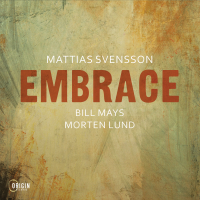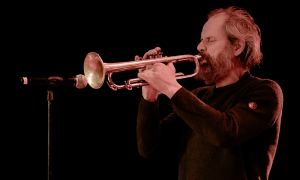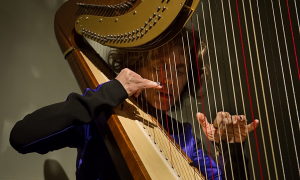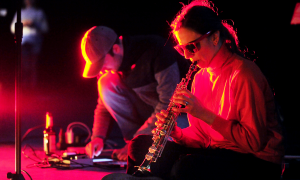Home » Jazz Articles » Festivals Talking » Jazzkaar Interviews: Kristjan Randalu
Jazzkaar Interviews: Kristjan Randalu
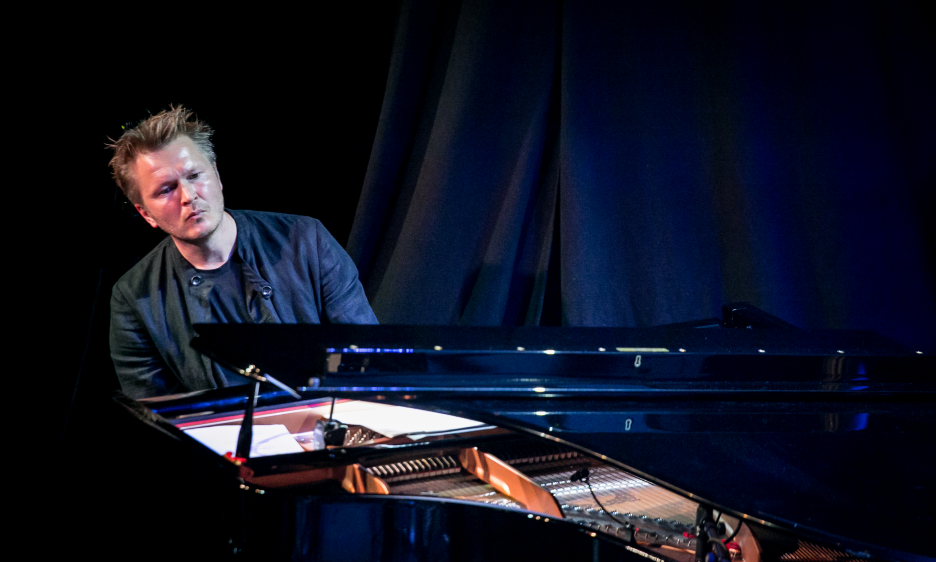
Courtesy Siiri Padar
Your scribe and this keysman ended up with a most unusual interview setting: Longley was just departing from Tallinn as Randalu had freshly landed from Oslo, following a week-long tour with the Norwegian trumpeter Mathias Eick, celebrating the release of the new ECM album Lullaby. Still in the airport's secure zone, we had a surprisingly quiet chat in the departure's library area. There is a piano there, but Randalu didn't trinkle.
"Margins And Dividends" is directly based around the 1981 sequence of 24 pieces by the Estonian composer Jaan Rääts, released on LP in 1986. These original "Marginalia For Piano" works are all miniatures, and were played on the record by Kristjan's father Kalle Randalu. The album's second side features an electronic interpretation, and this will be reflected by the presence in Randalu's band of two players who customarily load their tables with cables, consoles and laptops.
Rääts isn't so familiar outside of Estonia, even for folks who regularly immerse themselves in this land's music. For a native contemporary sonics admirer, though, he is a prime figure, as Randalu explains. "He was definitely part of the system, or establishment of composers, but maybe not commercially known to a wider audience. He used to be the head of the composers union, and a very influential pedagogue."
Indeed, many current Estonian composers were students of Rääts.
"My parents, both being pianists, already hung out with their colleagues, so I already knew him in my childhood," Randalu recalls. "From the time in the 1980s, when the Marginalia original for piano was actually recorded by my father. He premiered the pieces. A few decades later, when I did my first orchestral album, I wanted to take some advice, so I visited him, as a mentor. I got some advice from him on orchestration, so that was a very special connection."
Rääts lived right next to the Tallinn radio building, although he was born down in Tartu (1932-2020).
Randalu will unveil a reinterpretation that is still mostly composed, but is open to the realms of improvisation, inching it well within the jazz perimeters. He will be joined by ostensible guitarist Eivind Aarset, who will extend his sonic reach via a hoard of electronic devices. Then, there will be another keysman in the shape of Taavi Kerkimäe, who mostly moves in classical circles, but who will also bring along multiple effects boxes. The bassist is Mihkel Mälgand, an omnipresent player who is also a regular cohort of Kadri Voorand. Completing the line-up is drummer Hans Kurvits.
"I'm looking at the original, but a selection, not the idea of doing the complete thing," Randalu elucidates. "Simply what triggers the music. There will be solos, there will be improvisation, there will be open sections, interactions. Even in the originals, there's some blues influence. There might not be swing, but I think that the approach is jazz."
Neoclassical, as a genre, is not all that it appears. "Musically speaking, I see Rääts as a link to the neoclassical world. Not the neoclassical of today, but rather Shostakovich. This term meant something else, more like the expressionist movement, with Prokofiev, growing out of that, where structures and forms and sounds are pretty straightforward and clear. And also rhythm. I see a connection there..."
Randalu embraces the original, but is of course intent on a modern times transformation. "It's completely re-written," he says. "I have scores for everybody, and some of them have more arranged elements, others less. I want to have those spaces, for sure, but at the same time it's not the idea that we go onstage and just see what happens. These are clear structures and forms. With the line-up of having me with the piano, plus keys and guitar, with all kinds of sounds and effects, we are all in the same range, I would say, so it will definitely need some organizing and it will overlap."
This will become clearer when the entire band assembles in the same room. "We had a meeting as a quartet, but Eivind will join us at the rehearsal. The written material is ready, but consciously I want to have these islands where players can actually add something. So, I won't be altering the written material anymore. Although it might happen during the process of the rehearsal," he smiles.
There are three concerts altogether, with smaller shows down in Viljandi (17th April) and Haapsalu (19th), before the Jazzkaar gig on the 20th. Okay, so the Tallinn performance won't be strictly the premiere, but it will provide the climax of this mini-tour, for sure.
Randalu and Aarset played together with the Tunisian singer and oudman Dhafer Youssef, so their rapport is well-established. Randalu's last gig with that band was in 2015, following five years together.
"I will play me, I'll do what I do," says Randalu, thinking of his relationship within an electronica wash. "There are more spacious sections and then more rhythmic, that will need more precise sounds. Taavi Kerkimäe is mostly active in the contemporary classical world, and at the same time, with baroque, but I've known him over the decades to be involved in pop or jazz, having the flexibility to do that. I did not envisage a front line melody instrument on top of everything, so how could I add something to the structure, and not necessarily a bebop orientated player who would start playing lines, but someone who could add to the soundscape?" Yes, the answer lay with Kerkimäe, who will bring two banks of keyboards, and hopefully his theremin.
Randalu has known drummer Kurvits for quite a while, from when he was a student. He played with the fast-rising pianist Kirke Karja, in her quartet. Malgand is, of course, a core player on the Estonian scene.
Randalu will be very active during 2025, having recently released three albums, and planning on attendant live performances. Aside from the Eick LP, there is a Schubert collection and a jazz trio set (Latent Info) on the Enja label. Randalu definitely views all of the coming activity as pleasure rather than obligation, emanating keenness for the performances lying ahead.
Jazzkaar Festival runs from April 20 to May 1, 2025.
Tags
Festivals Talking
Kristjan Randalu
Martin Longley
Estonia
Tallinn
Mathias Eick
Eivind Aarset
Mihkel Mälgand
Kadri Voorand
Hans Kurvits
Dhafer Youssef
Kirke Karja
PREVIOUS / NEXT
Support All About Jazz
 All About Jazz has been a pillar of jazz since 1995, championing it as an art form and, more importantly, supporting the musicians who make it. Our enduring commitment has made "AAJ" one of the most culturally important websites of its kind, read by hundreds of thousands of fans, musicians and industry figures every month.
All About Jazz has been a pillar of jazz since 1995, championing it as an art form and, more importantly, supporting the musicians who make it. Our enduring commitment has made "AAJ" one of the most culturally important websites of its kind, read by hundreds of thousands of fans, musicians and industry figures every month.










